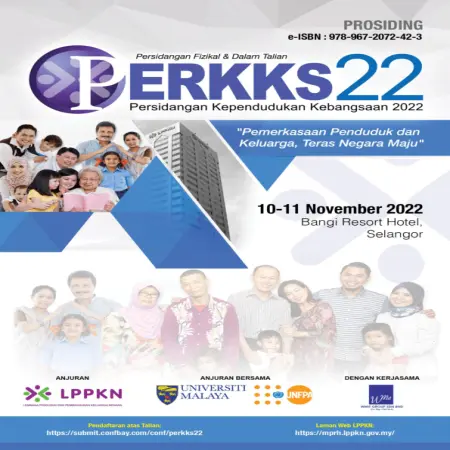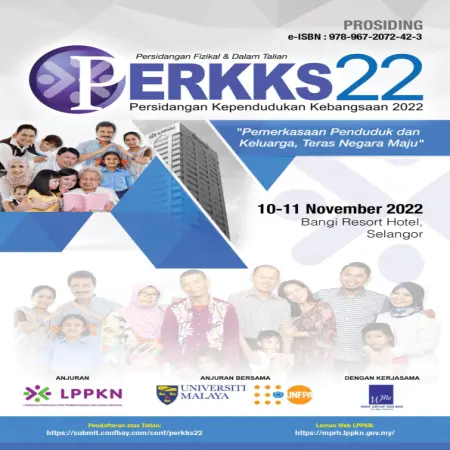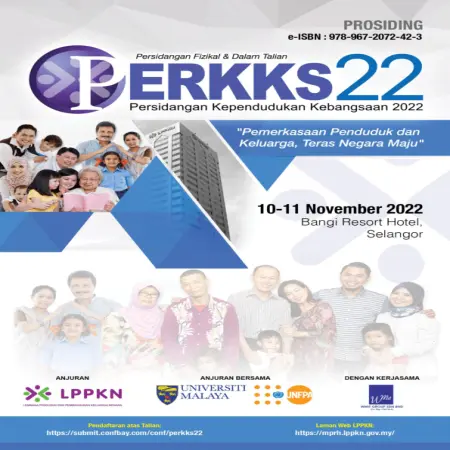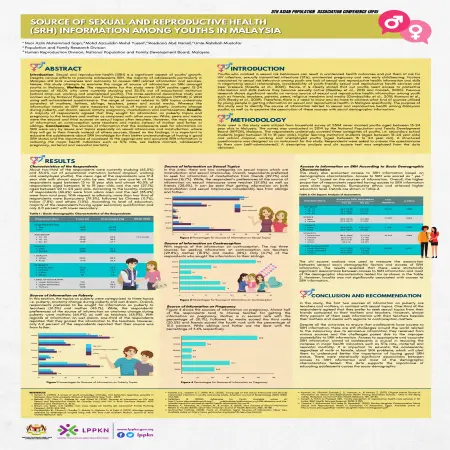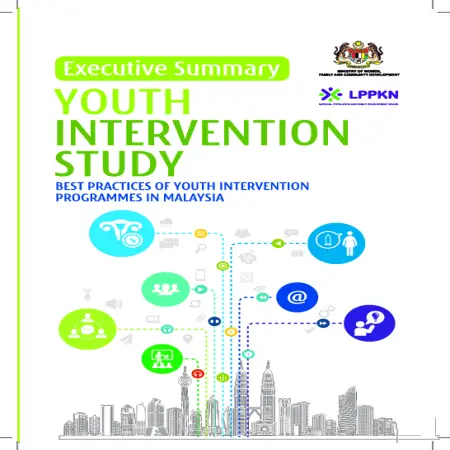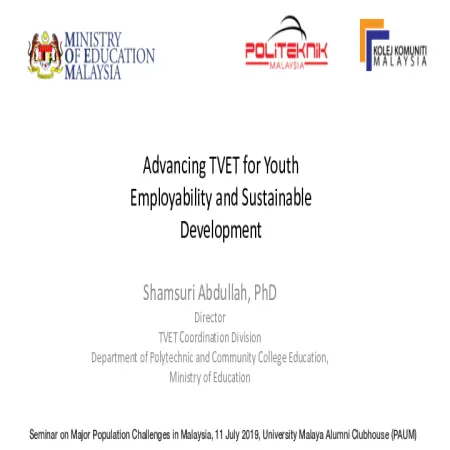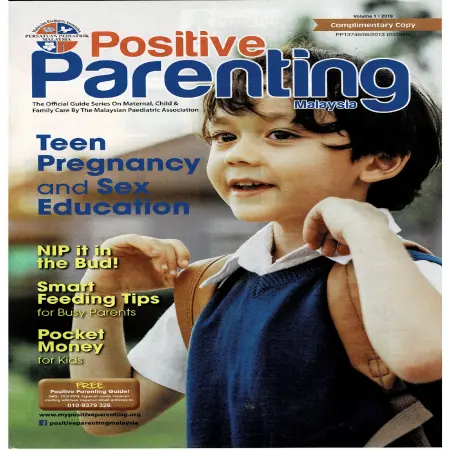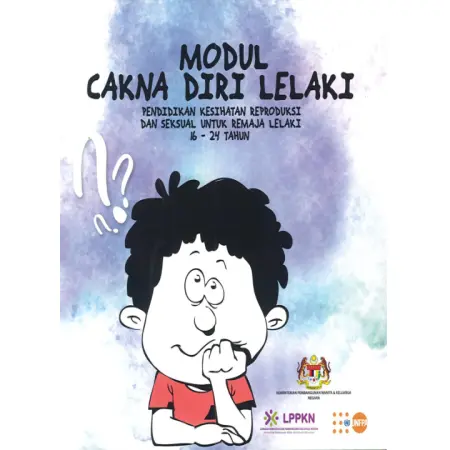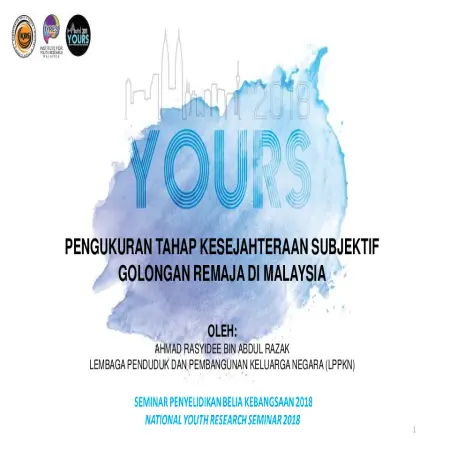TOPICS
Results for Topics : "Adolescent"
|
|
Reka bentuk aplikasi saringan mental sihat remaja
Item Type: Book Section
Editor:
Year: 00/00/2022
Abstract: Mental health is one of the most important aspects that must be met by every individual to achieve optimal health in addition to physical and social well-being. An increase in mental health-related problems can be seen every year and puts pressure on the daily life of patients among teenagers who are more susceptible to mental disorder factors due to the influence of the environment and current lifestyle, coupled with the situation of movement control orders (MCO) throughout Malaysia. However, many individuals do not undergo screening due to feeling of shame and are unware of their problems.
|
|
|
|
|
|
Relationship between family functioning, resilience and psychological well-being among B40 youths in the Klang Valley district
Item Type: Book Section
Editor:
Year: 00/00/2022
Abstract: Global economic uncertainties in the COVID-19 era have had an adverse impact on many households across nations, including Malaysian households. In particular, the B40 households have seen an upsurge in the cost of living, which puts a strain on their purchasing power. The Malaysian government has implemented various initiatives to alleviate the financial burdens of the B40 groups, such as Bantuan Prihatin Malaysia. Yet, the psychological wellbeing of the B40 group’s families are not under care.
|
|
|
|
|
|
Malaysian youths at risk: a review of mental health and maladaptive behaviors
Item Type: Book Section
Editor:
Year: 00/00/2022
Abstract: The contemporary world with its constant changes and challenges often poses great risks to the mental health of young people who are at the age of learning about themselves and the world they live in. Similarly, recent developments have indicated that Malaysian youths today are greatly affected by mental health issues and are easily driven by maladaptive behaviors.
|
|
|
|
|
|
Source of sexual and reproductive health (SRH) information among youths in Malaysia
Item Type: Scientific Poster
Editor:
Year: 00/00/2021
Abstract: A majority of respondents agreed that they sought for information on puberty topics and pregnancy to the teachers and mother as compared with other sources. While, peers and media were the second and third sources on sexual topics after teachers. However, the main sources of information on contraception were teachers and media instead of mother and father or siblings.
|
|
|
|
|
|
Executive Summary: youth intervention study: best practices of youth intervention programmes in Malaysia
Item Type: Research Report
Editor:
Year: 01/07/2020
Abstract: In the decades, Malaysia has undergone rapid economic, social and cultural changes which impacted not only the daily lives of its people but also their worldview and values. This is particularly so for young people, as excessive exposure to information from the social media, internet and pornography had inevitably influence their lifestyle and behaviour. The socio-cultural changes are likely associated with an increased rates of non-marital sexual activity, increased rates of sex partner change and increased rates of sexually transmitted infections (STIs). In 2005, the Ministry of Women, Family and Community Development through NPFDB introduced the PEKERTI Programme to be implemented at KafeTEEN adolescents centres. The programme provides reproductive health services, counseling services and education and skill building to promote a healthy life and inculcate positive attitudes and moral values among young people.
|
|
|
|
|
|
The well-being of adolescents in divorced families
Item Type: Thesis
Editor:
Year: 00/00/2020
Abstract: This study aimed to explore an in-depth understanding on the wellness of teenagers in divorced families. This qualitative study used the phenomenological approach to explore the experience of ten teenagers living with single mothers after the divorce of their parents. Participants in this research are 10 teenagers age between 16 to 18 years’ old who lived with their mothers after their parents' divorce. The duration of their parents' divorce during the data collection was in the range of one to ten years. Data were collected using semi-structured interviews and document analysis by social media. Data were analysed using NVIVO12 software. Nine themes and 26 sub-themes emerged from this study. Three main themes and ten subthemes answered the first research question on, what is the meaning of wellness among teenagers in divorced families? Another three more theme and eight sub themes answered the second research question on, what are the perception of teenagers towards wellness in divorced families? The remaining three themes and eight sub themes answered the third research question on, how does divorce changes the wellness in teenager’s life? In conclusion, teenagers’ in this study accepted the changes that occurred as a result of parental divorce. The implications of this study is viewed from three aspects; 1) practical implications for professions such as counselors, 2) theoretical implications for future research, and 3) implications in the field of education for the wellness of the community. The information extracted from the findings of this study can help counselors to understand better on the actual living experience of teenagers in divorced families. The study also helps counsellors to understand how some teenagers manage to live a successful life and fulfilling all the wellness of life in spite of living in divorced families. As this study only focus on teenagers living with their mother after their parents’ divorce, it recommends future researchers to consider exploring areas of wellness among teenagers in joint custody parents or teenagers living with their single father after the parental divorce.
|
|
|
|
|
|
Teen pregnancy and sex education
Item Type: Article
Editor:
Year: 00/00/2019
Abstract: Teenage pregnancy refers to any pregnancy in women or girls aged 19 years or younger. In 2016, the Ministry of Health recorded more than 12,000 teenage pregnancies in Malaysia. The National Registration Department reported that 4,992 children were born out of wedlock to girls aged 18 years and below. Teenage pregnancy is associated with immediate as well as long-term health risks. It is also accompanied by a number of negative consequences that are detrimental to the well-being of young mothers – disruption of education, limitation of opportunities for self-development and employment, social stigma and increased exposure to violence and exploitation. This article examines some circumstances resulting in teenage pregnancy and explores ways to support teenagers who face difficulties resulting from unintended pregnancy.
|
|
|
|
|
|
Modul Cakna Diri Lelaki Pendidikan Kesihatan Reproduksi dan Seksual Untuk Remaja Lelaki Berumur 16-24 Tahun
Item Type: Module
Editor:
Year: 00/01/2018
Abstract: The Sexual and Reproductive Health Module for boys and young men age 16 to 24 years was developed to address sexual and reproductive health as well as social issues for boys and young men. It is also aim to create awareness on the importance of reproductive health and social education as well as gender equality for future well-being. This module is divided into two (2) main target groups i.e. general adolescents (Module A) and most-at-risk adolescents (Module B). The main components of Module A includes topics on adolescent growth, developmental, health, psychosocial - 3R (Respect, Relationship and Responsibility), laws and regulations, drugs and substance abuse. Module B covers topics on risky social behaviors, risky sexual behaviors and teen pregnancy. This module is developed as an interactive form using various learning methods such as role play, sketches, group work and discussions to attract participation of boys and young men.
|
|
|
|
|
|
Pengukuran tahap kesejahteraan subjektif golongan remaja di Malaysia
Item Type: Conference or Workshop Item
Editor:
Year: 00/00/2018
Abstract: This presentation aims to measure the level of subjective well-being of adolescents in the country aged between 18 and 24 years old. A total of 2,597 respondents were analyzed using data from the Fifth Malaysian Population and Family Survey (MPFS-5). The article found that the level of subjective well-being is higher in female adolescents as compared to male adolescents, the level of well-being especially their standard of living, health and safety will be reduced in tandem with an increase in age.
|
|
|
|





